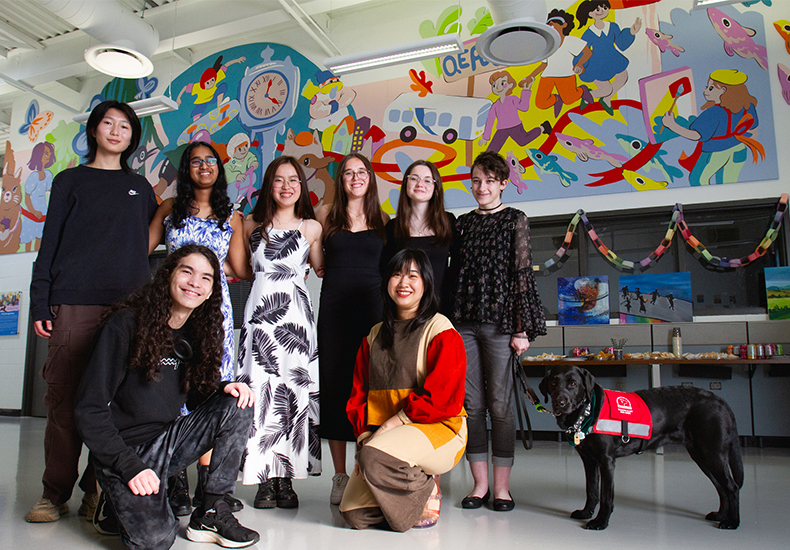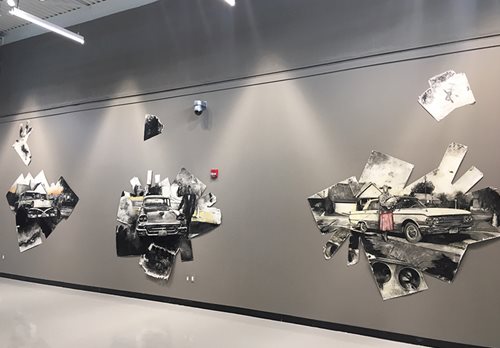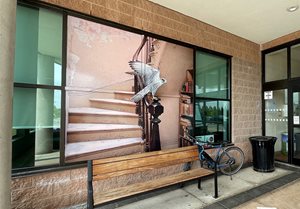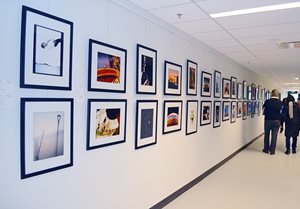Celebrating public art
We celebrate cultural history and creativity through our Public Art Program, Corporate Art Collection, and exhibitions at town facilities as outlined in the Visual Arts Policy. Roles and responsibilities for requesting and/or approving works are defined in the Public Art Procedure and the Temporary Exhibitions Procedure.
We maintain a Corporate Art Collection with works on display in many public meeting rooms and facilities.
Our exhibition program showcases creative work of local artists, including work by individuals, art organizations, instructors, and students. Queen Elizabeth Park Community and Cultural Centre (QEPCCC), Glen Abbey Community Centre, Oakville Trafalgar Community Centre and Trafalgar Park Community Centre offer free corridor exhibition space.
The Exhibitions Committee reviews proposals for exhibitions twice a year. Application due dates are February 1 and September 1.
New community centre mural celebrates community and diversity

The Town of Oakville has unveiled a vibrant new mural at Glen Abbey Community Centre that celebrates the town's diversity with a nature-inspired theme. Designed by local artist Julia YH, the mural was created in partnership with STEPS Public Art, a Canadian charity dedicated to community-building through art.
This 135-foot mural was completed with generous support from Oakville Paint and Decor Centre and Benjamin Moore. According to the artist, more than 20 cans of paint were used to transform this public art space in 23 days, with 60 residents contributing their own artistic touches.
Julia YH was selected through the CreateSpace Public Art Residency, a program that supports emerging Black, Indigenous (First Nations, Inuit, and Métis) and racialized artists. Julia is a Chinese-Canadian visual artist whose work blends anthropological insights into dynamic, site-specific designs. You can find her on Instagram at @_monkyi or on her website.
River Oaks Community Centre Youth Mural Project call for young artists
Youth Mural applications closed
Oakville Youth Mural Project invited up to 12 young artists (ages 13 to 18) to connect, create and collaborate on an indoor public artwork located at River Oaks Community Centre. Applications closed on August 2. The final mural will be unveiled during National Youth Week from May 1 to 7, 2025.
Following the huge success of our inaugural team at QEPCCC this past year, a new group of budding young artists will receive hands-on experience in the process of designing and creating public art, guided by the expertise of local professional artist and accomplished muralist Yasaman Mehrsa. Selected youth are required to attend three workshops this fall to develop the design concept and six painting workshops next spring to collaborate on a large-scale mural in one of the community rooms. All workshops are free, and no prior art experience is required. Additionally, participants will gain 40 volunteer hours through their involvement in the project.

Members from last year's team of youth artists pose with artist Yen Linh Thai and the mural they created at QEPCCC Youth Centre.

QEPCCC youth mural earns honorable mention
The Queen Elizabeth Park Community and Cultural Centre youth mural “A trip through town” led by artist Yen Linh Thai received an honorable mention for the “2024 Public Art Sustainability Award” at the Creative City Network of Canada Summit held in Vancouver in October 2024!
Explore local art and artists in Oakville
Beauty and Struggles by Layla Abdulhadi
Glen Abbey Community Centre
Layla Abdulhadi is a Canadian artist whose passion for oil painting and her brushwork traverses' multiple styles and subjects with ease. Her oil paintings, rich in detail and narrative, range from the intricate realism of wildlife to the tranquil classicism of still life.
Layla’s canvases capture the essence of diverse themes, whether it be the dynamic poise of a snake amidst a burst of tropical fruits or the quiet composition of a kitchen scene.
A Beach Glass Quilt by Elena Martoglio and Oakville Residents
Trafalgar Park Community Centre
Quilting is an ancient crafting technique which uses multiple pieces of fabric to stitch into one large material. Often used as bedspreads or blankets, quilting a padded material provides care and protection.
As part of the “We Are Kerr” project, Elena Martoglio and members of the Kerr Street community worked together to create squares using beach glass from the shores of Lake Ontario and other found materials. By piecing them together, this glass quilt serves as a symbol of the care and protection we place in Kerr Village and all neighbourhoods in Oakville.
REALLUSION by Hsia Chiang
Oakville Trafalgar Community Centre
Photograph for thought, wanderlust for creation. Explore the ancient streets of Beijing, traverse the intimate alleyways of Shanghai, tread the trails of Western Sichuan, and immerse oneself in the paths of Eastern Guizhou.
Through the lens, Hsia Chiang observes the life in China's diverse urban and rural area. Embark to Yosemite National Park, gaze upon Annapurna peak, and meander through Morocco, where the Sahara meets the Atlantic.
Unpredictable Flowers by Catriona Forsyth
Trafalgar Park Community Centre
In her exhibition, Unpredictable Flowers, Catriona Forsyth shares her paintings of flowers from her own garden. This collection of work represents the outcome of growing, photographing, sketching and painting.
Catriona has been painting and drawing since childhood. She has a degree in Fine Arts & Art History from the University of Waterloo. Following graduation, Catriona exhibited in a variety of solo and juried shows across the GTA, Oakville, Cambridge, and Hamilton.
Harmony by the Canadian Caribbean Association of Halton (CCAH)
QEPCCC Main Gallery and Town Hall
As we proudly celebrate Black History Month, the Canadian Caribbean Association of Halton (CCAH) and Curator Francesca Durham are honoured to present this year’s art exhibition, inspired by the theme of harmony.
Featuring the works of 16 remarkable artists, this year’s exhibition illuminates the beauty and strength of diversity through the lens of creativity. These talented artists contribute to the evolving artistic landscape of today and tomorrow, offering perspectives that inspire connection and collaboration. Each piece reflects the essence of harmony—from the vibrant rhythms of African and Caribbean influences to narratives of resilience, reconciliation, and triumph.
Explore community Connextions throughout Oakville
Our temporary public art project, Connextions, is on display!
New works of art are featured on prominent windows at recreation facilities to build community spirit and reflect on the idea of reconnecting.
Corridors
ArtWorks Oakville – Member Show
Bei Yong – Nature in Jewelry
Black History Display – Oakville’s Black History
Corporate Collection – Selected Works
Elena Martoglio – Spirit Awards 2025
Jane Marie Whyte – Spirit Journey Creations
Monika Raciborski – Amplify
Oakville Art Society – Timeless
Oakville Camera Club – Capture Oakville 2025
Oakville Fibre Artists – Industrial
Oakville Quilters' Guild – Quilts in Two-Colour Ways
Romay Lynne Huerto – Through Nature, We Flourish
Youth Corridors
Rain Sun – Self-Portrait of a Cat
Display Area
Guler Caglar – Imagination III
Oakville Museum Satellite Space
It Belongs in a Museum! How and Why Museums Collect and Preserve
On display from February 2025 to January 2026
Town Hall, 1225 Trafalgar Road
North Atrium
- Alvin Tan – Blooming, 1974
- John Alford - The Sinking of U-94, 1983
- Karl Woetz – Avancez
- Michel Foucault – Le Bucheron, 1988
- Neville Palmer – Standing Form (After Noguchi), 1974
- Neville Palmer – Vertical, 1974
Selections from the Corporate Gifts collection from our Sister Cities: Huai’an, China; Neyagawa, Japan; and Dorval, Quebec.
Upper North Atrium
- Fred Schopf – Portrait of Allan M. Masson, Mayor, 1966
- Ian Lazarus – Maquette for “Falling Up”, 1983 (On loan from Oakville Galleries)
- John McKinnon – Maquette for “The Perfect Fit”, 1988 (On loan from Oakville Galleries)
- John McEwen – Maquette for “Still Life and Blind” (On loan from Oakville Galleries)
- Josef Petriska – Untitled, 1982
- Manfred – A Moment of Trust, 1988
- Mark Lewis – The Smell of Books, 1993-1994 (On loan from Oakville Galleries)
South Atrium
Josef Petriska – New Life
Upper South Atrium
Tim Rainey – Mystical Presence (East Side)
Meeting Room A
Norman Choo – Warm Shower Ends a Day, 2003
Bronte Room
Sydna Bell-Windeyer – Old Bronte Harbour, 1988
Thomas Mathews – Fishing Scene, 1974
Oakville Room
David Newman – Untitled, 1962
Thomas Mathews – MacDougald’s Warehouse
Thomas Mathews – Sixteen Mile Creek, 1967
Sixteen Mile Sports Complex, 3070 Neyagawa Boulevard
Liz Pead – Louis Riel and the Church at Batouche, 1885, 2014-2015
Queen Elizabeth Park Community and Cultural Centre, 2302 Bridge Road
Thomas Chatfield - Maple Red
Oakville Public Library
Central Branch, 120 Navy Street
- Almuth Lütkenhaus – Tibetan Girl, 1967 (3rd Floor)
- John Willard – Toucans, Tigers and Zebras Oh My! (2nd Floor)
- Ronald Arnott Baird – Gates (Various locations)
- Thomas Chatfield – Montreal River (3rd Floor)
- George McElroy – Easter in Early Oakville
- George McElroy – Trotting Races on the Sixteen
- George McElroy – Shipbuilding on the Sixteen
- George McElroy – The “Radial” Crossing on the Sixteen
Woodside Branch, 1274 Rebecca Street
Gwyneth Young – Untitled, 1962
Oakville Galleries is a not-for-profit contemporary art museum with exhibit spaces in two locations:
The following works are located in the Gairloch Gardens sculpture park:
Wind Bower, 1990 by Catherine Widgery
Steel, laminated walnut and mahogany
Active as a sculptor for 30 years, American artist Catherine Widgery has developed many public artworks that integrate technology and the natural environment. Widgery’s Wind Bower is located just steps away from the main entrance of Oakville Galleries at Gairloch Gardens. This interactive and immersive work captures the shifting sights and sounds of the garden. The open structure of metal rods with a seating area and a canopy of softly tinkling wind chimes, is at once a product of industry and intellect, and a pleasant, shady nook for passers-by to sit in and become attuned to the shifting sensations of nature.
Giant Beaver Charm, 1999-2000 by Fastwürms
Chrome-plated steel, surgical stainless steel and bronze
The immersive art/life performative works and installations of the Canadian collective Fastwürms bring together conceptual art, popular aesthetics, do-it-yourself amateurism, and humour with various ‘sub-cultural’ sensibilities - queer, working-class, wiccan, occult, and gothic. The duo also has a long-standing affinity with and reverence for the natural world and animals, particularly cats (their own cats often feature in their work).
Wrapped around a distinctive willow tree standing at the edge of the Gairloch Gardens pond, Giant Beaver Charm is – as the title suggests – an oversized charm bracelet with a giant suspended beaver tooth, among other ornaments. Commissioned as part of the exhibition ‘Beaver Tales’ in 2000, it reworks and subverts Canada’s entrenched national icon, suggesting alternative symbolisms and systems of belief.
Falling Up, 1983 by Ian Lazarus
Buffed stainless steel
Since the early 1970s, Ian Lazarus has created sculptures for exhibitions and public environments in Malaysia, Ireland, Mexico, and across Canada. Glimpsed momentarily by motorists who drive past Gairloch Gardens along Lakeshore Road, Falling Up creates the paradoxical illusion of four solid, stainless steel pillars seemingly knocked upwards, as though rewinding backwards in time. This subtly surreal backwards motion catches viewers off guard, creating a temporary rupture in our understanding of gravity and the “natural” order of things. Falling Up is one of the first works that was commissioned for the Gairloch Gardens Sculpture Park.
Channel, 2004 by Liz Magor
Bronze
Over the past five decades, Liz Magor has developed a world-renowned practice that contemplates everyday items such as clothing, packaging, labels, furniture, twigs, branches, and tree stumps. Throughout our lives we are surrounded with ‘stuff’ both natural and fabricated, often forming complex relationships with them. Magor’s work considers what these relationships say about our personal desires and insecurities, as well as the wider pressures of societal, economic, and other outside forces that inform our attachments to things. Often her objects become subtly altered through processes of casting, remodelling, or resituating, so that the boundary between the real and the simulated is no longer clear.
Placed in a wooded area of Gairloch Gardens, Channel is a tree stump cast in bronze that seems at first glance to be entirely harmonious with its natural surroundings. A closer look, however, reveals two eye-like openings. This anthropomorphic twist catches us off guard, and reveals our profoundly unstable relationship to the things we think we know.
A Large Slow River, 1999 by Janet Cardiff
Audio walk (18 minutes)
Janet Cardiff is a Canadian artist who has been celebrated internationally for her work with sound; particularly her audio walks, which she has often made in collaboration with her husband and fellow artist George Bures Miller. A Large Slow River is an audio walk commissioned specifically to respond to Gairloch Gardens, made while the artists were in residence at the gallery. It was recorded on-site using omni-directional microphones that captured a soundscape of the gardens one might experience on any given day. The recording was then crafted into a uniquely moving and unsettling narrative audio work, which takes listeners on a walk around the gardens, drawing attention to the themes of water, time, memory, and displacement.
Still Life & Blind, 1988 by John McEwen
Aluminium and steel
John McEwen is well known within Canada for his large-scale sculptures of animals, namely dogs, deer and wolves, which are often flame-cut from slabs of steel. The artist is interested in how these specific animals often spark a sense of mystery and magic in the human imagination, and can reveal the interconnections between what we often perceive separately as ‘nature’ or ‘culture’. In Still Life & Blind, the sparse outline of a deer is barely visible from a distance, seeming to stand at the lake’s edge. In its original installation, the piece also included a “blind” - a camouflaged place for humans to watch animals without being seen. Here, it acts as a prompt to consider the relationship between viewer and viewed.
1929-1984 Landscape, 1973 by Walter Redinger
Fibreglass
Based in Ontario for most of his life, Walter Redinger was well known for his elemental, pod-like fibreglass sculptures. Created in 1973 (a year after Redinger represented Canada in the Venice Biennale), 1929-1984 Landscape is the first work that was commissioned for the Gairloch Gardens Sculpture Park. The title of the work alludes to the 1929 stock market crash and George Orwell’s well-known dystopian work of fiction, 1984. In framing the decades between these years, Redinger marks out an era of instability in which visions of a dystopian future were coming to pass. Vaguely anthropomorphic, the four figures in this sculptural group suggest a community, albeit one in which individual identities have been eroded by the mechanical and societal developments of a fast-changing world.


